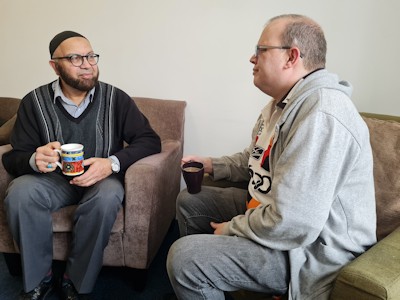Non-surgical oncology – or NSO for short - is the name given to services that provide treatment and care for cancer patients without surgery – mainly chemotherapy and radiotherapy.
NSO services in our region are organised in a unique way that was agreed more than 20 years ago. The Cancer Alliance has been asked by West Yorkshire Association of Acute Trusts to review the way in which non-surgical oncology services are delivered across West Yorkshire and Harrogate, with recommendations for improvement.
In developing proposals for more robust services for the future and delivering as much cancer care as possible closer to home, we have spoken to people affected by cancer (patients and carers) and people with an interest in cancer (staff) about what is important to them.
They helped us to develop some fundamental principles and we have worked alongside them to develop plans for the future.
It was important that everyone in West Yorkshire and Harrogate was provided with the opportunity to give their views on how those proposals might be improved and to ask questions about what matters to them. In total, we have spoken with more than 1600 people in more than 20 towns and cities across West Yorkshire and Harrogate. This engagement has shown that the changes proposed have significant public support.
This page is where you can find out how we worked with the public to help us to improve our plans for NSO services and how we have responded to what we heard.
What were these sessions about?

Engagement sessions and surveys were undertaken from July 2023 to September 2024 in more than 20 cities, towns and villages across the region, including Almondsbury, Birstall, Bradford, Brighouse, Featherstone, Harrogate, Leeds, Oakes, Pontefract, Skipton and Wakefield. Two online sessions, via Zoom, were also held.
To ensure that all our communities had been offered the chance to comment on the proposals, we held additional engagement sessions with voluntary sector groups who work with people at higher risks of health inequality or those who might have been underrepresented at earlier events. We heard views from a diverse range of individuals on what was important to them and how we could improve the plans.
Feedback was positive in support of the proposals, with over 90% of those consulted being positive about the proposals for drug therapies and over 80% positive about the changes proposed for outpatient services.
However, not all feedback was positive. Transport emerged as a key theme for consideration, as did the need to ensure that hospitals were mindful that not everyone is comfortable using technology when rolling out new ways for patients to access services. We shared this feedback with hospitals and agreed changes designed to increase the range of services available closer to patients' homes; to reduce the average number of times that patients are required to attend a hospital, and to support patient access to, and training in, the use of devices such as smartphones and laptops.
A summary of our engagement work and findings is available here
